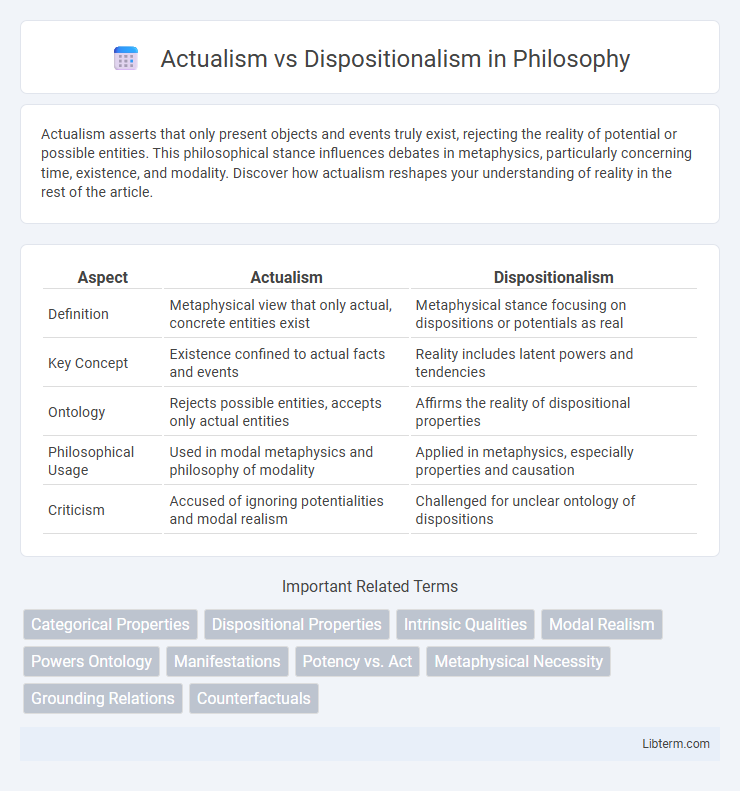Actualism asserts that only present objects and events truly exist, rejecting the reality of potential or possible entities. This philosophical stance influences debates in metaphysics, particularly concerning time, existence, and modality. Discover how actualism reshapes your understanding of reality in the rest of the article.
Table of Comparison
| Aspect | Actualism | Dispositionalism |
|---|---|---|
| Definition | Metaphysical view that only actual, concrete entities exist | Metaphysical stance focusing on dispositions or potentials as real |
| Key Concept | Existence confined to actual facts and events | Reality includes latent powers and tendencies |
| Ontology | Rejects possible entities, accepts only actual entities | Affirms the reality of dispositional properties |
| Philosophical Usage | Used in modal metaphysics and philosophy of modality | Applied in metaphysics, especially properties and causation |
| Criticism | Accused of ignoring potentialities and modal realism | Challenged for unclear ontology of dispositions |
Introduction to Actualism and Dispositionalism
Actualism asserts that properties and truths depend solely on what actually exists in the present reality, emphasizing a concrete and tangible approach to metaphysical entities. Dispositionalism, on the other hand, holds that properties are fundamentally dispositional or potential, emphasizing tendencies and capacities that may not be currently manifest but are inherently real. These contrasting perspectives shape debates in metaphysics regarding the nature of properties, causation, and modality.
Defining Actualism: Key Concepts
Actualism defines properties and truths strictly based on what actually exists and occurs in the world, emphasizing concrete, present realities rather than potential or possible states. It contrasts with dispositionalism by rejecting the notion that dispositions or potentials have an independent ontological status outside their actual manifestations. Key concepts in actualism include the denial of non-actual entities and grounding truth solely in actual events and properties, shaping debates in metaphysics and philosophy of modality.
Dispositionalism Explained
Dispositionalism explains properties as inherent tendencies or capacities within objects to manifest certain behaviors under specific conditions, contrasting with Actualism, which focuses on properties as they are currently manifested. Dispositionalism argues that understanding an object's potentialities provides a deeper grasp of its nature, grounding properties in causal powers rather than mere observable states. This perspective is crucial in metaphysics and philosophy of science, where potentiality and causation shape theories of property and identity.
Historical Background and Philosophical Origins
Actualism and dispositionalism trace their origins to early metaphysical debates in ancient and medieval philosophy, where thinkers like Aristotle laid foundational concepts distinguishing actuality and potentiality. In the modern era, these frameworks were refined through the works of philosophers such as David Lewis, who championed actualism, emphasizing the existence of concrete entities, while dispositionalism drew on the tradition of philosophers like John Stuart Mill, focusing on latent properties and causal powers. The historical development of actualism vs dispositionalism highlights contrasting views on the nature of properties, with actualism asserting only actual entities exist, whereas dispositionalism posits that dispositions or powers are fundamental ontological categories.
Core Differences Between Actualism and Dispositionalism
Actualism asserts that properties or powers must be actively manifested to exist, emphasizing their current, observable effects, while dispositionalism holds that these properties exist inherently as potentialities, independent of actual manifestation. In metaphysics, actualism ties existence closely to actual states of affairs, whereas dispositionalism centers on intrinsic capacities or tendencies that persist regardless of external activation. This core difference shapes debates on ontology, causation, and the nature of properties by differentiating between existence through actuality versus existence through inherent dispositionality.
Actualism: Strengths and Weaknesses
Actualism emphasizes the primacy of actual entities and events, providing a clear ontological framework that avoids relying on unrealized possibilities, which strengthens its applicability in metaphysics and epistemology. It faces challenges in explaining potentiality and counterfactuals, where dispositional aspects seem essential for capturing the full scope of causation and properties. The debate centers on whether actual properties alone suffice for grounding modality, with critics arguing that actualism may struggle to account for the intuitive reality of dispositions and future contingencies.
Dispositionalism: Strengths and Weaknesses
Dispositionalism emphasizes the inherent powers or tendencies of entities to bring about specific effects, offering a dynamic and realist approach to causation that captures potentialities often overlooked by Actualism. Its strength lies in explaining causal relations through stable dispositions, providing insight into counterfactual scenarios and modal aspects of reality. However, Dispositionalism faces challenges in precisely defining dispositions, addressing how dispositions manifest in actual events, and avoiding circular reasoning when correlating dispositions with their effects.
Major Debates and Philosophical Implications
Actualism contends that only currently actual properties and entities exist, emphasizing concrete realities, whereas Dispositionalism highlights potentialities and latent dispositions as fundamental aspects of nature. Major debates center on the ontological status of possible properties, with Actualists rejecting the existence of unrealized potentials and Dispositionalists asserting that dispositional properties are irreducible and causally efficacious. Philosophical implications involve causation theory, metaphysics of modality, and laws of nature, influencing how necessity, possibility, and causal powers are understood in contemporary metaphysics.
Applications in Metaphysics and Modal Logic
Actualism and dispositionalism offer contrasting perspectives on the nature of modal properties and possible worlds in metaphysics and modal logic. Actualism asserts that only actual entities exist, and modal truths must be grounded in actual world conditions, influencing theories of counterfactuals and necessity. Dispositionalism emphasizes inherent powers or tendencies in objects, shaping modal logic frameworks by interpreting necessity and possibility through the manifestation of these dispositions under various conditions.
Conclusion: Future Directions and Ongoing Discussions
Future directions in the debate between Actualism and Dispositionalism emphasize exploring the integration of dynamic causal powers with actual states to better understand modal properties. Ongoing discussions focus on refining metaphysical frameworks to accommodate both potentialities and actual manifestations, aiming for a more comprehensive theory of modality. Emerging research investigates the implications for metaphysics of science, particularly in relation to laws of nature and counterfactual reasoning.
Actualism Infographic

 libterm.com
libterm.com